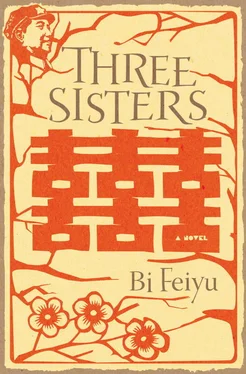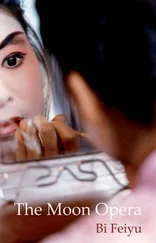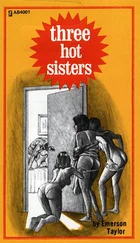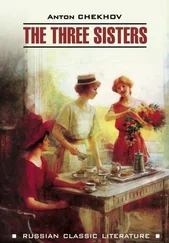In recent days the homeroom teacher had been on an emotional roller coaster, suffering mood swings from extreme happiness to intense sadness. There did not seem to be any reason for these mercurial changes, and, while Fenghua asked herself what was going on, she was smart enough to guess what was happening. Like her, he had a restless heart, and she worried about him, felt bad for him, and would have liked to share his anxieties. And yet, she experienced an indescribable sweetness, an irrepressible pleasure that was simultaneously sheer torture. In fact, nothing inappropriate had happened and nothing probably would in the end; but that was precisely why she felt such a yearning, such concern. Immersed in a welter of emotions, she felt like crying, but no tears came.
She returned to the dorm five minutes before lights-out, inattentively washed up, and climbed into bed. Experiencing similar mood swings as her teacher, she was confused and bewildered. Then Zhao Shanshan walked in, bringing with her a burst of cold air. The lights in the room went out almost immediately, so even though it was clear that something was wrong, no one could tell what it was in the pitch darkness.
Even so, Zhao managed to display how she felt by the noisy way she washed up, splashing water and banging against the enamel basin. Apparently Wei Xiangdong of the school security team had not had anything good to say to her. Shortly after Pang Fenghua had left to go to the homeroom teacher’s office, Wei had summoned Zhao Shanshan to talk about her penchant for giving her classmates nicknames. He had refrained from scolding her, but she was more terrified than if she’d actually received a reprimand, for Wei apparently knew everything she did in the dorm room. That little bitch Pang Fenghua had taken advantage of the homeroom teacher’s favoritism and ratted on her.
Trying to contain her anger, Zhao climbed into bed without a word. Even though the lights were out, her roommates could feel her blinding anger. “Don’t think I don’t know,” she said in a menacing growl, instantly altering the atmosphere in the room. “Don’t think I don’t know,” she repeated.
Pang Fenghua, whose thoughts still lingered on the homeroom teacher, emerged from her reveries and detected a threat in Zhao’s comment because Fenghua did indeed have something to hide.
“What’s the matter, Shanshan?” she asked uneasily.
“Don’t think I don’t know,” Zhao repeated as if reciting a poem. Of course everyone knew that her pointed comment was targeted at someone. “Don’t think I don’t know,” Zhao said one last time, intending to clear up an ambiguous situation, but actually making it even more ambiguous.
A strange, amorphous, dark object was thrashing around in the room. No one knew what Zhao knew exactly nor did they know what the connection was between what she knew and anyone else, especially Pang Fenghua. It was mysterious; it created suspicions. But not with Yuyang, who lay beneath her blanket, for she knew; she knew everything. And as she lay there quietly, she began to feel hot, so she stretched out her left leg and found a cool spot; her big toe rested against that spot. It was refreshing; it felt good.
Following a winter rain, the days grew increasingly cooler; actually, they became downright cold. Yellowed, withered leaves hung on the parasol trees, but there was nothing leafy about them. Even more of the leaves had fallen to the ground, where they were plastered to the road surface by the rain. What really caught people’s attention were the fuzzy acorns that still adorned the tips of the branches. From a distance, the campus looked like an orchard filled with fruit trees. But no harvest was in the offing; only winter was in the future, and indeed it was already the end of November.
On the other hand, late November actually began instilling the vitality of spring in the students; the campus turned lively despite the cold air, harsh winds, and dreary rain. A casual flip of the calendar revealed that 12-9 was barely two weeks away. [16] On December 9, 1935, high school and college students in Peiping (Beijing) staged anti-Japanese protests, which are commemorated by the holiday 12-9.
How could any school leave December 9—a revolutionary moment, a time when blood roiled, the day when the wind, the horses, and the Yellow River roared—off their schedule?
On that day the red sun shone brightly on the East as the god of freedom sang with loud passion, as described in a poem posted by Chu Tian, a student in the class of ’81.
You
12-9
Are a torch
You
12-9
Are a bugle
You’re sonorous
You’re aflame
December 9 was a holiday for the great mass of students; it was a holiday for Zhao Shanshan, a holiday for Pang Fenghua, and a holiday for Wang Yuyang. A holiday required celebration because that was what people did. There was nothing particularly memorable about their school’s form of celebration, which was to gather the students on the athletic field between classes for singing contests. The holiday would not be considered celebrated until they had all sung, had enjoyed a good and festive outing, and had seen the top three prizes awarded. Of course, the prizes lent the celebration a special character because every class fought hard to win them; and it wasn’t just the students who wanted to win. The homeroom teachers wanted to win, so did the music teachers. Section Three of the class of ’82 had fired blanks at that year’s sports meet, having come in fourth among the six sections of that class.
It was an utter failure that naturally made the homeroom teacher even more fervently hopeful about the singing contest. Having graduated from college in 1982, he did not plan to spend the rest of his life at the school; he intended to take the graduate school entrance examination. On the other hand, his reputation was on the line, and he could not take the contest lightly. He’d received his degree in political education from the provincial teacher-training college, and upon graduation, his counselor had impressed upon him the importance of honor and reputation.
“What is work?” the counselor had asked. “It is winning honors and gaining recognition. So don’t be shy or timid. Nothing happens when everyone wins honors, but if you are the only one who does, then a staircase will appear before you, allowing you to ascend to a higher level and see what others cannot see. That will be especially beneficial when it comes time for promotions, housing assignments, evaluations, selection as a representative, and marriage. If everyone has it, but you don’t, then you have wasted your energy. Your exhaustion will be a sign of poor health and nothing else. So you must strive for honors and recognition. You can break your skull and shed your blood, but you must turn around and start over. Never, ever be shy and timid.”
The homeroom teacher had already had a taste of what the counselor had talked about. On the night of the sports meet, the teacher whose class came in first even found a new way to smoke a cigarette. With his head held high and his chest thrust out, he looked less like a smoker than a tiger ready to conquer the world. With its defeat at the sports meet, Section Three must win back its honor at the singing contest so the homeroom teacher called a prebattle meeting to spur on the students.
Section Three began preparing for the contest earlier than the other sections. To keep the practices secret, the teacher found a nearby factory warehouse to rehearse in. This time they enjoyed a number of advantages. To begin with, Zhao Shanshan played the piano, which eliminated the need for a music teacher to accompany them. The extra points that earned would give them an edge with the judges. Unfortunately, the teacher held an unfavorable—actually, a quite bad—opinion of Zhao, who had been picking fights with Pang Fenghua. What had Zhao meant when she called her Taken? It seemed clear that Zhao was targeting him and that he had to be very careful. Yet, for the sake of the big picture—winning the contest—he had to put up with things the way they were and wait to execute the problem case after the contest.
Читать дальше











